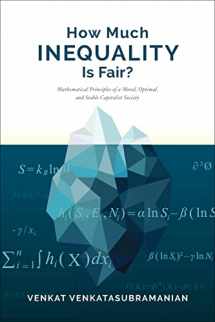
How Much Inequality Is Fair?: Mathematical Principles of a Moral, Optimal, and Stable Capitalist Society
Book details
Summary
Description
Many in the United States feel that the nation’s current level of economic inequality is unfair and that capitalism is not working for 90% of the population. Yet some inequality is inevitable. The question is: What level of inequality is fair? Mainstream economics has offered little guidance on fairness and the ideal distribution of income. Political philosophy, meanwhile, has much to say about fairness yet relies on qualitative theories that cannot be verified by empirical data. To address inequality, we need to know what the goal is―and for this, we need a quantitative, testable theory of fairness for free-market capitalism.
How Much Inequality Is Fair? synthesizes concepts from economics, political philosophy, game theory, information theory, statistical mechanics, and systems engineering into a mathematical framework for a fair free-market society. The key to this framework is the insight that maximizing fairness means maximizing entropy, which makes it possible to determine the fairest possible level of pay inequality. The framework therefore provides a moral justification for capitalism in mathematical terms. Venkat Venkatasubramanian also compares his theory’s predictions to actual inequality data from various countries―showing, for instance, that Scandinavia has near-ideal fairness, while the United States is markedly unfair―and discusses the theory’s implications for tax policy, social programs, and executive compensation.


We would LOVE it if you could help us and other readers by reviewing the book
Book review



